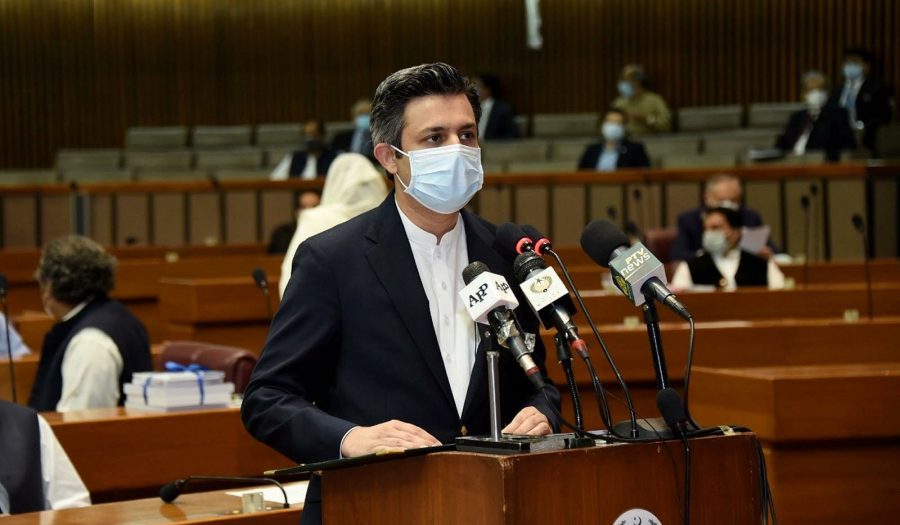Current account deficit reaches $20b, trade deficit hits $32b; Budget deficit reaches Rs2.3tr; Rs 179b for provision of subsidies on energy, food and others to ensure relief; NFC to be reviewed; Corona caused GDP to shrink by Rs3,300b, non-tax revenue declined by Rs102b adding to poverty, unemployment woes; FDI will be increased by 25%; POS sales tax reduced to 12% and minimum tax for hotels set at 0.5%; Corona-affected people to continue to get relief; Govt to revise 11th schedule; Tax on cigarettes, batteries, cigars increased from 25% to 100%; Federal excise duty on energy drinks increased to 25%; Sales tax on locally made mobile phones to be reduced
Staff Reporter
Islamabad
Amid negative effects of the coronavirus pandemic on economy, the Pakistan Tehreek-i-Insaf government on Friday presented its second federal budget for the year 2020-21, with total outlay of Rs 7.137 trillion focusing on facilitation of businesses, relief to the vulnerable segments of society, fiscal consolidation, revenue mobilization and austerity measures.
“No new taxes have been introduced in the budget for the upcoming fiscal year, which will not only provide relief to the common people but also boost economic activities across the country,” Federal Minister for Industries and Production Hammad Azhar said while presenting the budget in the National Assembly.
The minister highlighted the importance of striking a balance between mitigating the coronavirus effects and continuation of economic activities to keep the cycle of economy running.
He also underlined the importance of fixing primary balance at an appropriate level, stressing the need for continuation of Ehsaas Programme to help the vulnerable segments of society. The government would continue providing relief to the corona-hit people during the upcoming fiscal year, he said.
Hammad said the government wanted to continue the Extended Fund Facility programme with the International Monetary Fund.
He said the development budget would be maintained at an appropriate level to help achieve the GDP (gross domestic product) growth, with giving priority to the defence and internal security.
The minister said during the fiscal year 2020-21, the government had set the revenue collection target of Rs 6,573, including Rs 4,963 tax revenues and Rs1,610 non-tax revenues.
The minister said against the total Rs 7.137 trillion federal expenditures, the budget deficit would be recorded at Rs 3.437 trillion during the fiscal year 2020-21, which was 7 percent of the gross domestic product while the primary balance would remain at 0.5 percent.
He said the provision of relief to the vulnerable and deserving segments of the society was the government’s priority. The funds for Ehsaas Programme had been increased from Rs 187 billion last year to Rs 208 billion for the current year.
Likewise, he said, the government set aside Rs 179 billion for provision of subsidies on energy, food and others to ensure relief was given to low income people. The targeted subsidy would be provided to the deserving segment of the society, he added.
Hammad Azhar said the government also intended to review the National Finance Commission and fulfill its commitment that were made at the merger of erstwhile FATA (Federally Administered Tribal Areas) areas in the Khyber Pakhtunkhwa province.
He said effective measures had also been taken to enhance remittances, improve railway infrastructure, promote e-governance, and provide funds for the welfare of artists.
The minister said the allocations for Higher Education Commission had also been increased from Rs 59 billion to Rs 64 billion, while the government allocated Rs 55 billion for Azad Jammu and Kashmir, Rs 32 billion for Gilgit Baltistan, and Rs 56 billion for the merged districts of KP. In addition, the Sindh and Balochistan provinces would be given Rs 19 billion and Rs 10 billion respectively.
He said the government would try to enhance revenue collection without any change in the existing taxes. For providing relief to the construction industry, he said, the government would provide resources for the New Pakistan Housing Project.
The minister said the special programmes launched on the special directives of Prime Minister Imran Khan, including Kamyab Jawan Programme, Sehat Card and Billion Tree Tsunami Programme would continue while the government would take austerity measures and reduce its expenditures.
Taking the floor in an (initially) quiet lower house, Azhar began his speech comfortably enough, but was soon challenged by the opposition’s jeering as he got into the particulars of the government’s plans for next year.
At the outset, the federal minister said that the government’s top two priorities have been battling corruption, ensuring accountability, transparency in state institutions and merit-based decision making at every level.









